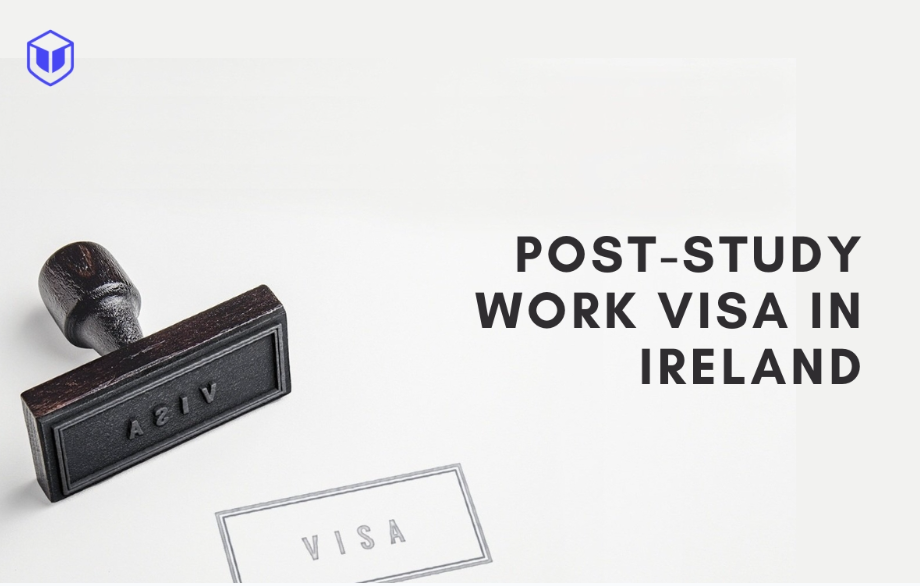Are you considering furthering your career in Ireland after completing your studies? You’re in good company! In 2023, Ireland approved over 16,000 work permits, with a staggering 40% increase from the previous year.
The Emerald Isle has become a magnet for international talent, especially from India. With over 45,000 Indians calling Ireland home, you’ll find a progressive community ready to welcome you.
But before you make a final call, there’s the matter of getting Ireland PSW after masters. PSW stands for post study work visas. A post study work visa in Ireland, officially known as the Third Level Graduate Programme, allows you to remain in Ireland after completing your studies to seek employment or gain work experience.
Willing to leap now? If yes, this blog post about the nitty-gritty of the acquisition process of a post study work visa in Ireland is everything you need. Dive in for details.
Key Highlights Table
Here’s a snapshot of all the important topics you’ll come across in this blog.
Choose your dream country
When do you want to study abroad?
What's your highest level of education?
Select you current city
How Leap will help you
Personalised University Shortlist
Express Applications with Quicker Admits
End-to-End Application Support
| Topic | Key Points |
| Types of Post-Study Work Visas in Ireland | Critical Skills Employment Permit General Employment Permit Internship Employment Permit |
| Ireland Post-Study Work Visa Duration and Levels | Level 7: Ordinary Bachelors Degree (three years courses) Level 8: Honors Bachelor's Degree / Higher Diploma (four years courses) Level 9: PG Diploma/Masters Degree Level 10: Doctoral Degree / Higher Doctorate |
| Average Annual Salaries | Average skilled worker salary: INR 45L (€50,000) Tech roles often exceed INR 63L (€70,000) |
| Work Opportunities After You Obtain a Post-study work visa in Ireland | Software Developer Data Analyst Pharmaceutical Researcher Financial Analyst |
| Employment Prospects | 93% employment rate for international graduates within a year. |
Also Read: Cost of Studying in Ireland for Indian Students: Fees and Universities
Why Work in Ireland?
Ireland's robust economy and welcoming atmosphere make it an ideal destination for international graduates. In 2023, the country's GDP grew by 12.2%, outpacing all other EU nations. This economic boom has created a wealth of opportunities across various sectors.
Explore the compelling reasons to kickstart your career in the Emerald Isle.

1. Booming Tech Hub
Dublin has earned its nickname as the "Silicon Valley of Europe".
Did you know that 80% of the world's top tech companies have their European headquarters in Ireland? You'll find yourself at the forefront of innovation, working with cutting-edge technologies. The Irish tech sector employs over 1 lakh people and contributes €13 billion annually to the economy.
With multinationals like Google, Facebook, and Apple constantly expanding their Irish operations, your career prospects in tech are boundless.
2. High Quality of Life
Ireland consistently ranks in the top 5% of countries for quality of life. With its positive work culture and progressive community, it's no wonder that 89% of international workers report high job satisfaction.
The country boasts a perfect work-life balance, with an average work week of 39 hours and a minimum of 20 days of paid annual leave. You'll have ample time to explore Ireland's 3,000 km of coastline, 400 castles, and rich culture.
3. Competitive Salaries
Your hard work pays off in Ireland. The average salary for skilled workers is INR 45L (€50,000) per annum, with tech roles often exceeding INR 63L (€70,000).
In fact, Dublin ranks 6th in Europe for the highest salaries in the tech industry. Moreover, Ireland's progressive tax system ensures that you keep more of your earnings, with the first INR 33L (€36,800) taxed at just 20%.
4. English-Speaking Environment
As one of only two English-speaking countries in the EU post-Brexit, Ireland offers a seamless transition. Over 98% of the population speaks English fluently. This linguistic advantage extends beyond the workplace – you'll easily integrate into local communities and build a diverse network. Additionally, Ireland's strategic location and EU membership provide excellent opportunities for business and personal travel across Europe.
Ireland Post-Study Work Visa Duration and Levels
Great news for international graduates in Ireland! You'll now receive a new visa stamp – Stamp 1G – under the Third Level Graduate Scheme. This means you won't need to apply for a separate visa extension. It's one less thing to worry about as you embark on your professional journey in the Emerald Isle.
The duration of your stay depends on your qualification level.
- If you've completed a degree at level 8 or above, you'll be granted a 12-month extension
- For those with a level 7 degree, you'll receive a 6-month extension. This gives you ample time to gain valuable work experience and potentially secure long-term employment.
Here's a quick overview of the duration of the post-study work visa in Ireland based on your level of education.
| Level of Education in Ireland | Ireland Post-Study Work Visa Duration |
| Level 7 – Ordinary Bachelors Degree (three years courses) | 12 months |
| Level 8 – Honors Bachelor's Degree / Higher Diploma (four years courses) | 12 months |
| Level 9 – PG Diploma/Masters Degree | 24 months |
| Level 10 – Doctoral Degree / Higher Doctorate | 24 months |
3 Types of Post-Study Work Visas in Ireland
Ireland has become increasingly popular among Indian students and professionals. In 2023, over 5,000 Indian students were granted post-study work visas in Ireland, a 25% increase from the previous year.
Currently, there are approximately 35,000 Indians employed across various sectors in Ireland, contributing significantly to the country's diverse workforce. There are primarily 3 types of post-study work visas in Ireland. They are as follows.
- Critical Skills Employment Permit - For high-demand, highly skilled occupations with a minimum annual salary of INR 29L (€32,000) or INR 57L (€64,000) depending on the role.
- General Employment Permit - Open to all occupations not on the *Ineligible List, with a minimum annual salary of INR 27L (€30,000).
- Internship Employment Permit - For full-time students with job offers in critical skills occupations, valid for up to 12 months.
*Please note: The Ineligible List, maintained by the Department of Enterprise, Trade and Employment, includes occupations for which work permits are not granted. This list typically includes roles that can be filled by the domestic or EU workforce, such as general labourers, hospitality staff, and certain administrative positions. The list is regularly updated based on labour market needs.
The table below lists the costs associated with each of the 3 types of post-study work visas in Ireland. Have a look.
| Types of Post-Study Work Visas | Cost to Obtain the Post-Study Work Visa in Ireland |
| Critical Skills Employment Permit | INR 81,000 (€1,000) |
| General Employment Permit | INR 40,500 (€500) |
| Internship Employment Permit | INR 40,500 (€500) |
Eligibility Criteria for Obtaining a Post-Study Work Visa in Ireland
Ireland's post-study work visa, known as the Third Level Graduate Programme, has become increasingly popular among international students.
The processing time for the Ireland PSW visa is 2-4 weeks. This surge reflects the programme's attractiveness and Ireland's growing appeal as a career destination for international graduates.
To be eligible for the post-study work visa in Ireland, you must meet the following criteria.
- Hold a valid Stamp 2 immigration permission at the time of application.
- Have completed a qualifying degree programme at level 8 or above on the National Framework of Qualifications (NFQ) from an eligible Irish higher education institution.
- Have graduated within the last 12 months from your programme of study.
- Hold a valid passport for the duration of your intended stay.
- Provide evidence of sufficient funds to support yourself during your stay (typically INR 2.7L or €3,000).
- Have private medical insurance coverage for the duration of your stay (typically INR 45L or €50,000).
- Maintain a clean criminal record.
- Pay the required application fee (currently INR 27,000 or €300).
- If you've completed a PhD (NFQ Level 10), you must have completed your studies in Ireland and graduated no more than 12 months before applying.
- Demonstrate English language proficiency, typically through IELTS (minimum score of 6.5) or equivalent.
Also Read: Duolingo Accepted Universities in Ireland in 2024
Benefits of Obtaining a Post-Study Work Visa in Ireland

Ireland's post-study work visa offers several for international graduates. In 2023, over 13,500 non-EEA students availed of this opportunity, marking a 45% increase from the previous year. This surge reflects the visa's attractiveness and the country's growing appeal as a career destination.
With a 93% employment rate for international graduates within a year of completing their studies, the benefits are clear. Go through some of the benefits of obtaining an Ireland PSW after a master’s degree or graduation.
1. You Gain Professional Experience in Ireland within Your Field of Study
This hands-on experience is invaluable, allowing you to apply your academic knowledge in real-world scenarios. Many Irish companies offer graduate programs specifically designed for international students, providing mentorship and accelerated career growth. Some notable companies with such programs include the following.
- Accenture
- Deloitte
- PwC
- KPMG
- Bank of Ireland
- AIB (Allied Irish Banks)
- Kerry Group
- Vodafone Ireland
- Johnson & Johnson
- Workday
2. Equal Treatment as Irish Citizens in Job Applications and First Step in Obtaining Permanent Residency
This policy ensures that all applicants, regardless of nationality, have an equal opportunity to secure employment based on their qualifications and skills. The average starting salary for graduates in Ireland is INR 27L (€30,000), with STEM fields offering even higher remuneration. After working for five years on a valid permit, you become eligible for long-term residency, paving the way for a permanent future in Ireland.
3. Freedom to Work Anywhere in Ireland
Having a post-study work visa in Ireland allows you to explore different regions of the country, from bustling cities to picturesque coastal towns. Moreover, Ireland's EU membership grants you easy access to 26 other European countries, perfect for weekend getaways or business trips.
List of EU/EEA countries are Austria, Belgium, Bulgaria, Croatia, Cyprus, Czech Republic, Denmark, Estonia, Finland, France, Germany, Greece, Hungary, Iceland (EEA), Ireland, Italy, Latvia, Liechtenstein (EEA), Lithuania, Luxembourg, Malta, Netherlands, Norway (EEA), Poland, Portugal, Romania, Slovakia, Slovenia, Spain, and Sweden.
Top 5 Work Opportunities After You Obtain a Post-study Work Visa in Ireland
Ireland's job market has shown remarkable resilience and growth, particularly for international graduates. In 2023, the employment rate for non-EEA graduates on post-study work visas reached 91%, up from 89% in the previous year. The Irish economy grew by 9.4% in 2023, creating a surge in job opportunities across various sectors.
Here's a table showcasing the top 5 jobs for international graduates in Ireland, along with their average starting salaries.
| Job Title | Average Starting Salary (INR) |
| Software Developer | INR 45L - INR 55L (€50,000 - €61,000) |
| Data Analyst | INR 41L - INR 50L(€45,000 - €55,000) |
| Pharmaceutical Researcher | INR 43L - INR 54L (€48,000 - €60,000) |
| Financial Analyst | INR 39L - INR 48L (€43,000 - €53,000) |
| Marketing Specialist | INR 36L - INR 45L (€40,000 - €50,000) |
Support and Services To Obtain Post-Study Work Visa in Ireland
You don't have to toil alone to obtain a post-study work visa in Ireland. In 2023, over 32,000 international students chose Ireland for higher education, with many utilising professional consultancy services.
In fact, you can take the benefit of the many services that Leap Scholar offers. Leap Scholar offers assistance with understanding visa requirements, preparing necessary documents, and guiding the application process.
Also Read: Ireland Student Visa Rejection Rate
To Conclude
As you've seen, Ireland offers a wealth of opportunities for international graduates. With its booming economy, high quality of life, and generous post-study work options, it's an ideal destination to kickstart your career.
Remember, over 16,000 work permits were approved in 2023, and the country's GDP grew by an impressive 12.2%. Whether you're drawn to the thriving tech scene in Dublin or the competitive salaries across various sectors, Ireland provides a supportive environment for your professional growth.
The new Stamp 1G system simplifies your transition from student to professional, allowing you to focus on what matters most – building a successful career in one of Europe's most solid economies.
Frequently Asked Questions (FAQs)
-
Q: What is the cost of living in Ireland for international students?
A: The cost of living in Ireland varies depending on the city and lifestyle. On average, you can expect to spend between INR 9L (€10,000) to INR 13L (€15,000) per year. This includes accommodation, food, utilities, and personal expenses. Dublin tends to be more expensive than other cities, with rent being the largest expense. However, many universities offer more affordable on-campus accommodation options.
-
Q: Can I bring my family with me on a post-study work visa in Ireland?
A: Yes, you can bring your spouse and dependent children with you on your post-study work visa. They will be eligible for a Stamp 3 visa, which allows them to live in Ireland but not work. If your spouse wishes to work, they'll need to secure their own employment permit. It's worth noting that Ireland's family reunification policies are generally favourable for skilled workers.
-
Q: What are the tax implications for international graduates working in Ireland?
A: As an international graduate working in Ireland, you'll be subject to the Irish tax system. The first INR 33L (€36,800) of your income is taxed at 20%, with earnings above this threshold taxed at 40%. You'll also pay PRSI (Pay related social insurance), which is 4% of your income and USC (universal social charge). However, Ireland has double taxation agreements with many countries, including India, which can prevent you from being taxed twice on the same income.
-
Q: Are there networking opportunities for international professionals in Ireland?
A: Absolutely! Ireland has a vibrant networking scene for international professionals. Organisations like Network Ireland and the Dublin Chamber of Commerce regularly host events. Many multinational companies have internal networks for international employees. Additionally, platforms like InterNations and Meetup.com are popular for connecting with fellow expats and locals alike.
-
Q: What are the prospects for entrepreneurship in Ireland after completing studies?
A: Ireland is known for its supportive start-up ecosystem. The Start-up Entrepreneur Programme (STEP) allows non-EEA nationals to start a business in Ireland with a minimum investment of INR 45L (€50,000). Enterprise Ireland, the government organisation responsible for developing Irish enterprises, offers various support for start-ups. Dublin, in particular, is home to numerous incubators and accelerators that cater to international entrepreneurs.
-
Q: How does Ireland's healthcare system work for international graduates on a work visa?
A: As an employee in Ireland, you'll be entitled to public healthcare services. However, there may be some charges for certain services. Many employers offer private health insurance as part of their benefits package. If not, you can purchase private health insurance, which often provides faster access to specialists and private hospitals. It's advisable to research and secure appropriate health coverage soon after arrival.
-
Q: What are the opportunities for further education while working in Ireland?
A: Ireland encourages lifelong learning, and many universities offer part-time or evening courses that you can pursue while working. Some employers even sponsor employees for further education. The Springboard+ initiative offers free or subsidised courses in areas of skills shortage, which could be an excellent opportunity to upskill or re-skill while working.
-
Q: How easy is it to travel within Europe while working in Ireland?
A: As Ireland is part of the EU, you'll find it very easy to travel across Europe. While Ireland is not part of the Schengen Area, your Irish work visa allows you to apply for Schengen visas easily. Many budget airlines operate from Irish airports, making weekend trips to European cities both affordable and convenient.
-
Q: What support is available for international graduates facing workplace issues in Ireland?
A: Ireland has strong employment laws protecting all workers, including international graduates. The Workplace Relations Commission provides information on employment rights and can mediate disputes. Trade unions are also active in many sectors. Additionally, many larger companies have dedicated HR departments to handle workplace issues.
-
Q: Are there opportunities to learn Irish (Gaeilge) while working in Ireland?
A: Yes, there are many opportunities to learn Irish. While not necessary for most jobs, learning Irish can deepen your cultural experience. Many local libraries and community centres offer free or low-cost Irish classes. Online platforms like Duolingo also have Irish language courses. Some companies even offer Irish language courses as part of their employee development programs.
-
Q: What are the prospects for permanent residency after the post-study work visa in Ireland?
A: After living and working in Ireland for 5 years on valid employment permits, you become eligible to apply for long-term residency. This can lead to permanent residency or even Irish citizenship. The process is straightforward, especially for skilled workers, and Ireland welcomes immigrants who contribute to its economy and society.
-
Q: How does Ireland's work culture differ from that of other countries?
A: Irish work culture is known for being relatively relaxed and friendly, with a strong emphasis on work-life balance. The concept of "craic" (fun, entertainment) is important, even in professional settings. Networking and building personal relationships are crucial. While punctuality is appreciated, there's often flexibility in working hours. The hierarchical structure in many Irish companies is less rigid compared to some other countries, encouraging open communication across all levels.















Have Questions? Get Guidance to reach your Dream University
Connect with India's finest counsellors and biggest study abroad community.
Get Guidance